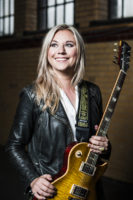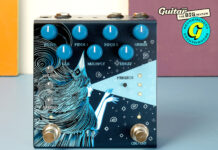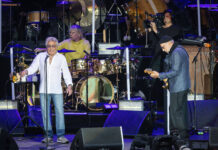
Woman Tone: Is The Guitar Industry Sexist?
“What’s wrong with being sexy?” asked Nigel Tufnel in 1984’s This Is Spinal Tap. It was a satirical acknowledgement of the fact that, even though most male rock artists of the era were plastered in more makeup and hairspray than the females in their audiences, the music business was far from a level playing field for women. Fast-forward to 2018 and while it feels like we’re at a crossroads in gender politics in the wider world, has anything really changed for the better in the guitar industry, or is it as sexist as it ever was?
Story Thea De Gallier
Australian guitarist Orianthi has been a standard-bearer for women in the guitar world
Photo © Eleanor Jane
It’s a question that never goes away, and one that, as yet, hasn’t been answered satisfactorily. Some will roll their eyes and groan at the mere mention of the word, while others will have earnest concerns. The question isn’t about the merits of veganism or whether Brexit was a good idea – although they tend to elicit similarly polarised responses. It’s this: is the guitar industry sexist?
Historically, it has often presented women as a prop. The NAMM show’s ‘booth babes’ aren’t seen with such regularity these days, but they’re still there. Rolling Stone’s annual 100 Greatest Guitarists lists recycle the same male names year after year, with only Bonnie Raitt and Joni Mitchell deemed worthy of inclusion on the 2015 list (which also only had four women on a judging panel of 59).
Influential female guitarists from all genres – Joan Jett, Orianthi, Nita Strauss, Tracy Chapman and Jennifer Batten, to name but a few – often find themselves relegated to ‘best female’ lists (although Strauss has just become Ibanez’s first female endorsee). Guitar World only stopped filling its Buyer’s Guide special with bikini-clad women in 2016, while Revolver’s ‘Hottest Chicks In Hard Rock’ feature was killed off with the magazine’s change of ownership last year.
Even notable female players sometimes unwittingly stall any critical thinking when they mistake fetishising female players for supporting them. “I tell ya right now, if a woman walked in here and looked like Pamela Anderson and played like Jimi Hendrix, there’s not a band in the world that wouldn’t be falling to her feet and saying: ‘Will you be in my band?’ Men like it when women can play guitar,” said Chrissie Hynde in an interview back in 2016.
As hard as it is to believe today, outrageous adverts such as these were commonplace in guitar magazines well into the 1990s
WHICH CAME FIRST?
What we’re left with is a chicken-and-egg situation: did the guitar industry evolve as a male-dominated environment because fewer women played guitar, or did fewer women play guitar because they felt unwelcome and overlooked by the guitar industry?
“Even as someone from the industry, walking into a guitar shop used to be very similar to walking into a mechanic’s garage,” says Helen Varley, who looks after the Gretsch, Charvel, Jackson and EVH brands as Head Of Specialty Marketing at Fender EMEA.
“It has changed; I’ve been working at Fender for nine years now, and when I first started, it was a bit of an old man’s club. If you wanted to work for somewhere like Fender or Gibson, you had to know someone. If you were in a band it was like: ‘Yeah I can work in marketing, because I was in a band’, but they started to realise they can’t just hire a load of ex-musicians; they need to hire people who are talented in specific disciplines.”
Fender diversifying its recruitment policy has, Helen says, led to more women working in the company, but “my peers in other companies do seem to be chaps”. In her experience, however, women are still uncomfortable when it comes to guitar shopping. “One female artist I’m working with didn’t want to go into a shop and try the guitars out in front of all the guys,” she says. “I said we could send the stuff to her house, or she could come to our invite-only showroom in London. Before we’d even got very far with the conversation, she was worried about how she was going to try the guitar out. I’ve not in my experience had that kind of reaction from any of the male artists that I deal with – they don’t really give a shit!”
The reason for that self-consciousness could be a result of wider societal pressures faced by women, or simply because of a bad experience. “I walked into a guitar shop the other day with my father. The guy working there ignored me and just said ‘hi’ to my dad,” remembered guitarist Chantel McGregor in a 2016 interview with The Telegraph. “So I told him exactly what I wanted – the precise specifications, using all the right jargon. He was dumbfounded that a girl could discuss music and knew what she was talking about. I’ve had people in shops ask me: ‘Do you know what a plectrum is?’ It’s pathetic.”
Chantel McGregor has bemoaned the dismissive treatment that women can experience in guitar shopsPhoto © Keith Newhouse
PUSHING UP DAISIES
Combatting the overly male environment of the guitar store was something that Tish Ciravolo set out to do when she founded Daisy Rock guitars in 2000. It’s easy to see why the guitars themselves are sometimes scoffed at; shaped like flowers, covered in glitter and garish in poster-paint colours (although there are a couple of more subdued models in the range), they look like children’s toys and might inadvertently give those already predisposed to casual misogyny another reason to dismiss women playing the guitar.
St Vincent, upon releasing her first signature model with Music Man in 2016, said she’d been “offended” by floral guitars as a Pantera-loving child (St Vincent designed her Music Man signature model with women in mind, giving it a streamlined shape and light body, but with the proviso that it was never intended to be for women only). Nevertheless, Tish started Daisy Rock with the best of intentions. “I started playing in bands in LA in the 80s and there were only a handful of girls who played instruments,” she recalls.
“When I went to a guitar store and bought my first bass, my boyfriend and the guy behind the counter chose the bass I should play, because they just didn’t know how to handle a girl coming into a music store. It’s not that they weren’t nice, but it was an anomaly. I took home a Fender P-Bass, which felt like a baseball bat, so the next day, I took it back and sat in the store and played every bass they had on the wall until I found something I thought would fit me, which was a Yamaha BX-1 bass. That was my first indication that there weren’t many girls doing what I wanted to do.”
Sister Rosetta Tharpe was one of the many women who had a huge impact on the development of guitar music
As Tish found out, finding a suitable weight took some testing of different models. Helen says that it’s a case of knowing what you’re looking for, and there’s no need to market lighter guitars at women. “It’s a myth that women need special guitars. A first-time buyer wouldn’t necessarily know that there are 30 different woods that a guitar can be made of and that perhaps you should lead towards ash, because that’s lighter than mahogany or something like that,” she says. “But what a guitar is made of is
not its first selling point. If you look at the Fender Strat, over the years, it’s been made of loads of different woods, and that’s because of availability.”
Tish admits she “didn’t think of the ramifications of doing a pink flower, I just thought it would be something cool for my daughters”, and concedes that “being gender-specific is not always the best”. That said, she says that even if she were starting the company today, she’d still use the same designs.
“When I started this, four per cent of the guitar population was female. Now it’s closer to 30 per cent, because of the guitar company I started. There are at least 500,000 girls out there that play because I started the company,” she claims, backing it up by referring to statistics gleaned by looking at warranty cards for guitar sales over the last 20 years, and annual sales reports compiled by US magazine, Music Trades. Even so, she admits that Daisy Rock’s profits are now “less than half” of the $2.5m the company was reportedly making in 2005.
GUITARS FOR ALL
Despite products ‘for girls’ being considered problematic in most industries, Tish is not setting out to diminish female guitarists; she simply wants, she says, to make the guitar a viable option for young girls developing an interest in music. Alba, a Spanish-born, London-dwelling guitarist and songwriter who played a number of European festivals, including Sonisphere, with her old band Sons Of Rock, agrees with the sentiment. “Starting early is key, and I don’t think electric guitars are considered as gifts [for girls]. It’s really important they aren’t just considered as a male instrument,” she says.
Finding female role models was difficult for her. “I started doing some research and I found so many pioneers that had been forgotten, like Sister Rosetta Tharpe. She was one of the first electric guitarists ever,” she says. “There’s a need for women to be there in those rankings in the media. They don’t have the recognition they should.”
None of that means that women aren’t picking up guitars. Fender CEO Andy Mooney said last year that 50 per cent of all its new sales were to women. Helen says the statistics relate to the Fender brand itself, rather than her more alternative-leaning brands, and suspects many of those sales are of acoustic guitars. “We believe that that’s generally because the ladies want instant gratification, but if you’re looking at the electric world, you’ve got to buy a pedal, an amp, all these other nerdy things, and that doesn’t broadly appeal to a lot of the females,” she says.
Tish, when talking about Daisy Rock’s early days, echoes this observation. “My husband [Schecter president Michael Ciravolo] helped me design them, he knows about pickups and frets and those things that are not exciting to me and never have been,” she says. Hers and Helen’s assertions that women aren’t excited by the ‘nerdy’ side of guitars may be borne from their own experiences in the industry, but they’re still perpetuating a stereotype to some degree; if even women working behind the scenes say that’s how women view guitars, where does that leave those who are excited by the technical aspect?
How women interact with guitar brands is difficult to measure. “We only just started to sell direct as of last year on fender.com,” Helen says.
“Our route to market has always been the guitar shops, so we can only work out what’s going on by looking at the TV and festival stages, and from the reorders from guitar shops. In the music industry and the record industry, there are societies that collate data, but we don’t have anything like that for the musical instrument industry. We can buy research from the guitar magazines, but that’s a very limited audience. I’m not entirely sure how many females would buy a guitar magazine…” However, even that tide may be turning thanks to emerging titles such as She Shreds, a magazine “dedicated to women guitarists and bassists.”
Alice Cooper guitarist Nita Strauss is the first woman to be given an endorsement deal by Ibanez
SHARING THE STAGE
Festivals are a good example of the gender imbalance – a study last year found 80 per cent of headliners were men, and The PRS Foundation’s Keychange initiative has been launched to try and achieve gender parity by 2022. The Great Escape and Liverpool Sound City are two of the 45 festivals who’ve pledged to do this. Download and Reading/Leeds, two of the most guitar-heavy – and male-heavy – festivals, haven’t signed up, but their parent company Festival Republic is behind the Re:Balance scheme, a three-year project in which an industry committee picks female artists for studio time and commits to giving them a festival slot.
Other initiatives, such as the international DIY movement Girls Rock Camp Alliance, aim to empower women to take up the guitar. Girls Rock Camp began in Portland, Oregon, but now operates across the US and UK, with volunteer-run youth workshops that aim to foster self-esteem through teaching girls and non-binary teens to play rock instruments. Setting targets for women’s participation garners mixed reviews.
“If I was booking a festival, I don’t think I’d want to be bound to booking half women just for the sake of it,” says Aliases and Ravenface guitarist Leah Woodward. “If anything, I think that puts more of a divide on it. One half of me says it’s a good idea to get more women involved, but I don’t see a reason to give them a massive boost onto the stage because they’re technically equal [in terms of talent] to any guy.”
Joanne Shaw Taylor is one of the most recognised female guitarists on the UK scene, but she’s still hugely in the minorityPhoto © Eleanor Jane
Helen takes a similar viewpoint. “I can’t market something that’s not good just because they’re female and they tick the box,” she says. “Obviously, I am very pro females playing guitar, but it’s like all-women shortlists. I get it, but I don’t agree with it, because you’re not then winning on merit, you’re winning because you’re like a consolation winner.”
Some would argue that doing things on merit would mean men continue to hog the limelight, purely because of the ratio of male-to-female musicians. But women in the industry, whether they’re players or working on the gear side, don’t want their gender to be their defining factor. “I don’t care if it’s played by a girl or a guy or a monkey, if it’s good,” laughs Leah. Of course it shouldn’t matter who’s playing the guitar if they’re good at it, but guitars don’t exist in a vacuum exempt from the sexism present in wider society.
Quotas may not be a perfect solution, but the guitar industry, and the music industry at large doesn’t accurately reflect the wealth of female talent out there. The fact that people have noticed this at last means that, hopefully at least, we’re finally starting to see some progress…The post Woman Tone: Is The Guitar Industry Sexist? appeared first on The Guitar Magazine.
Source: www.guitar-bass.net












